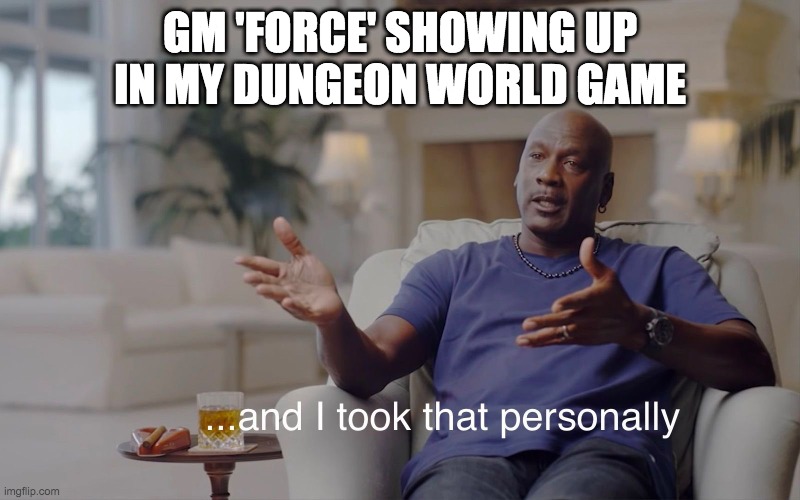Here are some posts of mine from this thread:I am--or at least was--earnestly trying to understand what "Force" means. I had assumed "make it so the character definitely appears here, where the players just happen to be" automatically made it Force because I was doing what was convenient to keeping the game going, as referenced earlier with Force being what is used to make desirable results happen.
So...yeah. I honestly have no idea what's supposed to differentiate "scene framing," "Force," and the player-triggered-DM-authorship stuff that had confused me so much.
GM Force is neutral, in the sense that it's a technique - namely, the use of certain authority (over mechanics and/or adjudication and/or the fiction) in order to achieve outcomes and/or frame scenes without regard to the players' declared actions and the goals at which those declared actions aim.
The difference between the players can declare whatever actions they like for their PCs and the players are expected to declare actions that conform to a pre-established sequence of events is clear.
The difference between the GM secretly changes mechanical details like dice rolls and hp totals on the fly and the GM doesn't alter those details, and/or manages them in the open, is clear.
The difference between the GM creates new bits of backstory - second-stringers to replace defeated BBEGs, or clues to prompt the players to make the "right" action declarations - in order to keep play "on track", and the GM doesn't do that, is clear.
The difference between the GM uses their authority over scene-framing to ensure that a series of pre-authored scenes take place and the GM frames scenes in accordance with some other principle - eg extrapolating from the prior backstory (as in a sandbox or map-and-key dungeon) or following player cues (as in Burning Wheel) or building on the fiction and the action declarations in a soft-then-hard-move pattern (as in AW or DW) - is clear.
I personally tend to think of Force as a certain approach to the use of authority the GM enjoys as GM - ie certain ways of exercising authority over backstory, situation/scene-framing, resolution and adjudication, etc.
Whereas pressuring players via social cues about preferred action declarations (eg as per FrogReaver's example just upthread, about the consequences of declaring an attack) I think I wouldn't consider Force because it is not the GM using their GM's authority, but simply the GM acting as a participant.
The basis on which I call it a type of Force, or Force-ish, is what I have been discussing, upthread, with @Campbell: the GM is using their authority over the fiction (eg the backstory of the Rainbow Rocks) in order to try to shape the players use of their authority over action declaration (ie to have them declare actions about travelling to and exploring Dark Clouds).
I'm not seeing any disregard of the players' declared actions and the goals at which those declared actions aim. Nor any ensuring that a series of pre-authored scenes take place.what's the number-one reason for using Force? To ensure a satisfactory story. (A "palatable narrative", as @prabe put it upthread.) The satisfaction/palatability is ensured by (i) pre-authorship, and (ii) "curation" on the way through via the use of Force to make sure action declarations don't perturb things, and to make sure the right scenes are framed.
What's the main risk in the use of Force? That the players arc up!, because the actual impact on the fiction of their action declarations is not what they thought/hoped/expected it would be.
Obviously scene-framing can involve force - when it is done in disregard of prior outcomes, with a pre-conceived series of situations/events in mind. Now maybe I'm missing something, but from what you posted - "we were going to need to re-introduce our Druid player who had been out of the game for about a year" - all I'm seeing is a decision that the Druid is present in this particular scene, so that the PC's player can be part of the game.



